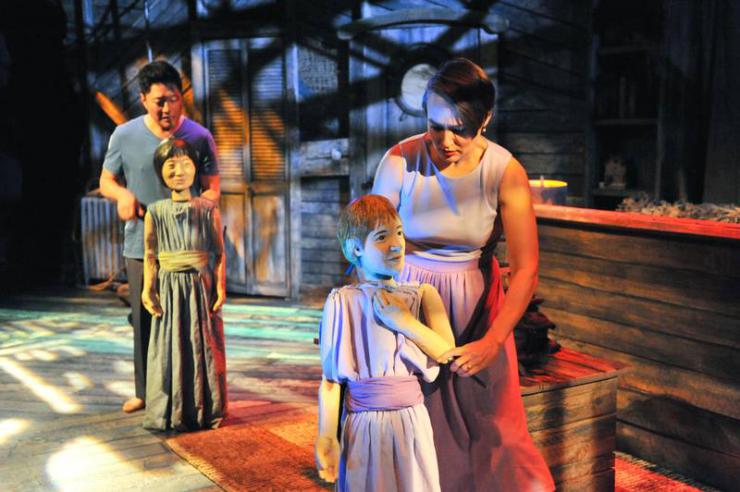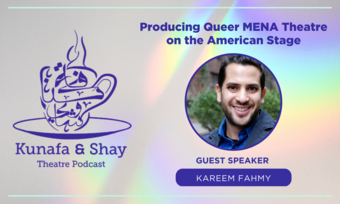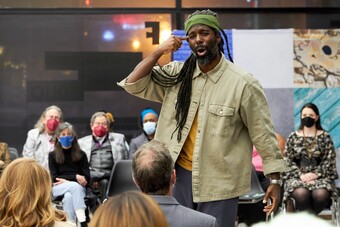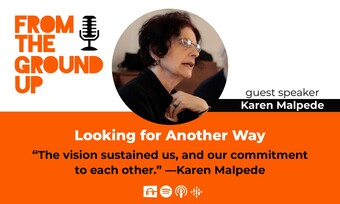When the Process Works
This blog is a companion piece to Michael Elyanow’s recent article “The Value of Collaboration.”
For me, there is no better joy than collaboration when it’s working well. And if you’ve worked in the field at all, you know that not all collaborations are created equal. When they’re good, as Michael said in his article, it’s the reason we do this insane thing we do. It’s vital and alive and stimulating and thrilling. When they’re not as good, they can be bruising and painful and difficult and make you question why on earth you dedicate your life to this madness.
I started out as a playwright. But early on, I segued to directing for a variety of reasons: as a playwright, I’m neurotic, lonely, behind the eight ball, and go to the fridge at the slightest provocation—few of those descriptors apply to me when my directing hat is on (or at least less often!). Also, and more importantly, I don’t write plays that are as lyrical, theatrical, and brilliant as the ones I like to direct. Pretty much as simple as that.
However, that doesn’t stop me from considering myself primarily a creator and a storyteller. And the privilege of working with a playwright to journey his play to fruition as its best self is a profound satisfaction. It makes me feel like a creator, even though I am not the creator of the world, but I hope, a brilliant illuminator of the words on the page—the artist that transforms them into the creation of the world on the stage. And that world becomes something that the playwright and I have made together.
Too often, playwrights have been abused by a system that doesn’t want them to write the play they’re writing but the play their play inspired in the mind of the person who read it.
Too often, playwrights have been abused by a system that doesn’t want them to write the play they’re writing but the play their play inspired in the mind of the person who read it. Playwrights are therefore rightly protective—burned from the last time they were driven by someone else’s solutions that caused their play to become a shadow of its genius self. And all of this is always done in the name of art, so that discerning the difference between useful shared thoughts versus the ones that will destroy any initial divine spark of the playwright’s becomes ever more difficult. It’s no wonder, then, that many playwrights’ righteous response to notes, thoughts, ideas, is: “Interesting. But no thanks.”
In the very best collaborations, however, I feel that my input has value. And that’s not because a playwright finds all my thoughts useful or feels the need to apply them all. It’s because we’re in a collaboration that makes clear that I am not an interloper bent on destroying the playwright’s genius but am his most profound advocate, working with him to clarify his text on the page and his meaning in the air. Often, I find myself the protector of the playwright’s own words against a bout of his own self-doubt. And I am bringing ideas about how to realize his play in three dimensions that empower it to be its most brilliant self, and possibly, as all good plays do, springboard beyond even the imagination of the initial impulse on the page.
In my favorite playwright interactions, a dialogue enables a really rich and valuable understanding on both sides. Discourse is such an important aspect of the best collaborations and should engender debate, disagreement, and passion. When all parties involved have open hearts and are genuinely listening, it is shocking what can be achieved.
Working on Michael Elyanow’s The Children was one of the most profoundly satisfying experiences I have had in the theater. First because of the process, which went the way new play development is supposed to go and rarely does. And second, because of the outcome, which allowed me to help realize a play that I found singular, highly theatrical, and unbearably moving in all the best ways.

At Boston Court, when we first read the play, we found ourselves excited, but also with a lot of questions and confusion. The play is a very beautiful, very funny, very powerful piece of theater with a number of layers that have to be unraveled. Once it gets to its truth, it is absolutely stunning. And what we all knew was that we’d never met an ending scene that moved us more. Initially, our questions were more about what happened along the way.
As it happened, Michael was coming through town for other reasons, so we put an unrehearsed in-house reading together so we could all listen and then talk about it. But we made this caveat: it is standard practice at Boston Court that if we offer feedback on a play, it is purely for the playwright to use or discard. It is in no way conditional. In fact, we won’t give feedback if the playwright is under any illusion that, should he change his play in response to our thoughts, we will then program the play, and we made that clear to Michael.
Nonetheless, he was interested in hearing feedback. After the reading, our entire artistic team—myself, my co-artistic director Michael Michetti, our co-literary managers Aaron Henne and Emilie Beck—sat around with Michael in the lobby and had an incredibly exciting discussion about the play. We had a lot of questions. And Michael was genuinely interested in the investigation. And we were interested in his answers. There was a lot of, “Ohhhh… now that I know that’s what you intended, here’s why I think I didn’t receive it that way,” and in return, a lot of “Ahhh, fascinating. I didn’t realize that’s how that would be experienced….”
So Michael went away, and we thought, “Cool. That was exciting.” Then he sent us a rewrite, which we read. The next time he was in town we had another in-house reading, and again we all sat around afterward and discussed with pleasure the journey the play had made and the places where we still had questions. And in spite of those questions, but partly based on how exhilarating the collaborative nature of our conversations, shortly thereafter, we decided to program the piece.
And the collaboration continued to be thrilling. Because we were all passionately invested in the story Michael was telling and the way he was telling it. Michael, Emilie Beck, who signed on as dramaturg, and I as director, continued to have enormously rewarding interactions about the work. There were many rewrites and adjustments on the way to the first rehearsal, as well as many incredibly important things that happened in the first week of rehearsal with five fine actors sitting around a table who of course greatly enriched the dialogue, the perspective, and the play.
The alchemy that was the glory of this process continued to brew something rare and beautiful through all the artists: the design team, the actors, the stage manager, and even the very active ASMs.
There was a crucial scene, toward the very end of the play (that happens during one of the tensest sequences it has ever been my privilege to direct) that Michael must have rewritten, with mine and Emilie’s encouragement, at least eight or nine times. Sometimes we were on the phone talking through a rewrite, we’d try it in rehearsal, and then get back on the phone to discuss why we hadn’t quite nailed it yet. Finally, when Michael was back for dress and previews he did yet another rewrite during one of the later previews, and when it clicked in, we all knew it.
Theater is an alchemy, as we all know, and the strange magic of mixing all these elements together sometimes brews something rich and strange, and sometimes, despite all our best efforts and intentions, falls flat, doesn’t rise, is curdled or lumpy or unsuccessful in what it set out to achieve.
The alchemy that was the glory of this process continued to brew something rare and beautiful through all the artists: the design team, the actors, the stage manager, and even the very active ASMs. It truly felt like every artist was passionately engaged together in making this profoundly moving piece of theater soar. It was a process and an outcome that was, as Michael said, truly communal and valuable. It was the oxygen we need to remind us why we do theater, and for that I am both humbled and grateful.














Comments
The article is just the start of the conversation—we want to know what you think about this subject, too! HowlRound is a space for knowledge-sharing, and we welcome spirited, thoughtful, and on-topic dialogue. Find our full comments policy here
When it all works together, it seems like magic, like a dream come true, a miracle. When it doesn't work, it can be a nightmare for everyone, especially a playwright. Jessica and Michael, your tandem comments, your example of what collaboration at its best can create, inspire the rest of us to do better. Thank you.